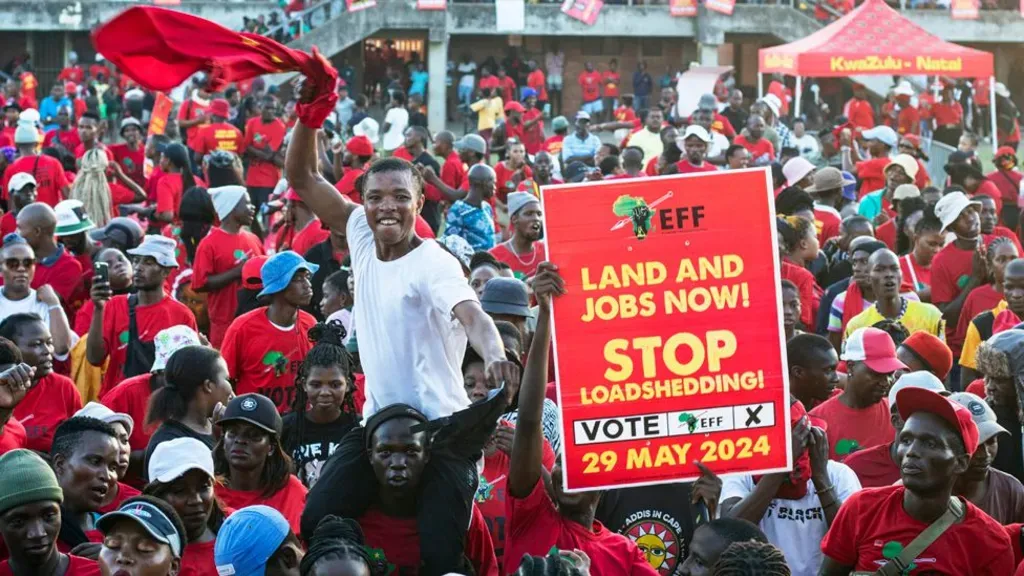DURBAN, SOUTH AFRICA — Hundreds of hopeful South Africans gathered at a government-organized job fair in Durban’s Umlazi township on Sunday, clutching CVs and school certificates, eager for employment opportunities. This scene underscores a critical issue in the country as it prepares for the upcoming general election on May 29: the crushingly high unemployment rate.
Queues stretched long, filled with anxious faces. South Africa’s unemployment rate stands at 33%, the highest in the world according to the World Bank. Among young people, it soars to 46%. This dire situation explains the lack of enthusiasm for the election among some attendees.
Mondli Magwaza, 37, who has never been employed, expressed her desperation for any job. “I’m desperate,” she said. Magwaza, like many others, has decided not to vote for the ruling African National Congress (ANC) this time around.
Zara, 44, recently retrenched, voiced her frustration with the ANC, despite having always supported the party for its role in ending apartheid. “Empty, empty promises. I feel very bad,” she lamented.
The ANC, which has dominated South African politics since the first democratic elections in 1994, faces its toughest challenge yet. Opinion polls suggest its share of the vote might fall below 50% for the first time, necessitating a coalition with smaller parties to retain power. Economic dissatisfaction is driving many to consider political alternatives.
Despite the grim statistics, young South Africans are actively seeking to improve their prospects. At the St Charles Lwanga Skills Centre in Orange Farm, 23-year-old Britney Finnis, dressed in a fuchsia overall, meticulously unscrewed an electrical socket. She is training to become an electrician, motivated by the scarcity and high cost of electricians in her community.
“It’s difficult finding a job and having these courses really helps a lot,” Finnis said. She plans to start her own business to secure employment.
In the sewing room, 34-year-old Rita Mida worked on stitching a black blazer. A housewife, Mida has given up on finding formal employment and aims to start her own business despite anticipating challenges in securing resources. “I am going to stay hopeful,” she said.
The Catholic Institute of Education of South Africa runs this center and 25 others nationwide. Nathan Johnstone, who oversees the program, noted that about 30% of graduates find jobs within a year, which is considered a success given the economic context.
South Africa’s employment minister, Thulas Nxesi, pointed to “historical structural issues” linked to education and skills development as a root cause of the country’s unemployment crisis. The legacy of apartheid and colonialism left deep economic and educational inequalities. “Scars will take a long time to heal,” President Cyril Ramaphosa remarked as the country marked 30 years of democracy last month, highlighting the “generational handing-over of inequality.”
The ANC has overseen a generation of South Africans through the post-apartheid education system, yet there remains a significant mismatch between academic training and labor market needs.
A 2019 World Bank report identified insufficient skills as a major constraint on South Africa’s economic transition. Economics professor Adrian Saville noted the lack of “work-readiness” among new graduates.
The government has been running job fairs across the country for four years, aiming to bridge the gap between training and employment. “We train them then pass them to the private sector to absorb them,” Minister Nxesi explained. However, he acknowledged the need for economic growth and investment to create jobs.
Persistent power problems and the impact of the COVID-19 pandemic, which resulted in the loss of two million jobs, have further hampered economic recovery.
The Democratic Alliance (DA), the ANC’s main political rival, has criticized the recent unemployment figures as a “jobs bloodbath” and promises to transform South Africa into an enterprise economy, citing the DA-led Western Cape as an example.
The Economic Freedom Fighters (EFF), led by Julius Malema, advocate for nationalization and propose a monthly stipend for unemployed graduates. Despite varied proposals across the political spectrum, the solutions remain untested, and the electorate’s skepticism is palpable.
At the Durban job fair, some attendees expressed continued support for the ANC, having seen no better alternatives. However, many, like an anonymous woman who shared her disappointment, feel let down. “The government has failed us. It’s very painful,” she said.
As South Africans head to the polls, the high unemployment rate remains a central issue, shaping the political landscape and influencing voter sentiment.
https://www.africanexponent.com/high-unemployment-spurs-south-africans-to-job-fairs/


